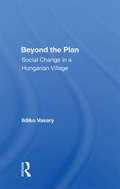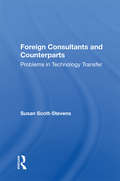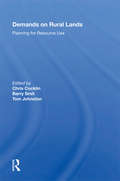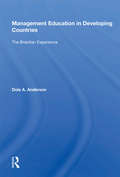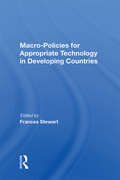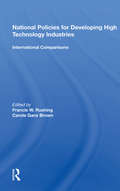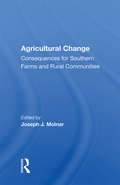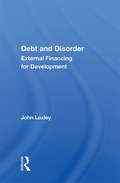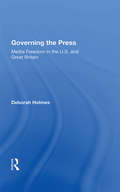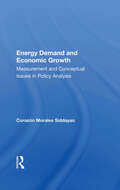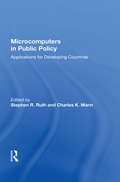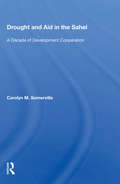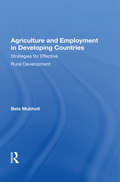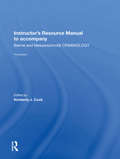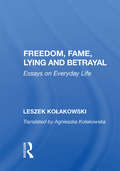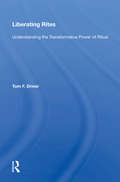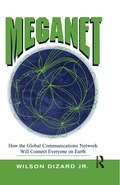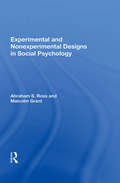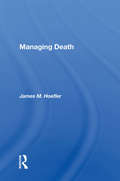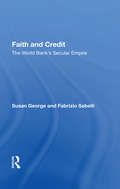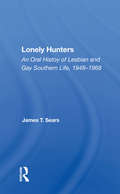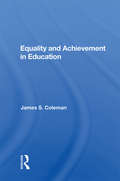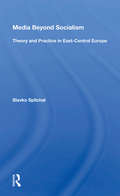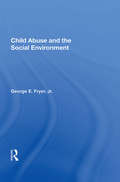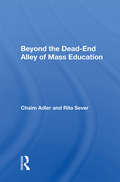- Table View
- List View
Beyond The Plan: Social Change In A Hungarian Village
by Ildiko VasaryThis book explores some of the possibilities and limitations inherent in collectivization by examining agricultural changes in one Hungarian village, Pecsely in which the transition from traditional peasant existence to a socialist society and collectivized agriculture could be traced.
Foreign Consultants And Counterparts: Problems In Technology Transfer
by Susan Scott-StevensEven though concern about and interest in technology transfer have existed since the 1950s, it has become of increasing importance to lesser-developed and developing countries since the 1970s. The transfer of technology in general, and in particular the transfer of technical knowledge, lies at the heart of the North-South debate. There is an abundance of literature on technology transfer in almost every field of interest--policy, practice, applied case studies, and general recommendations--but little, if any, of the information is integrated. It remains widely distributed throughout the fields of economics, business, rural sociology, and anthropology. The same may be said for various studies of consultants as change agents. On the other hand, studies of counterparts--host country professionals--have been almost entirely neglected, with the exception of their implied roles as innovators or acceptors. There have been few attempts to tie practice to theory, theory to research, or research to practice. This volume attempts to provide the link between theory, research, and practice. Based upon research conducted at two large-scale water resource development projects in Indonesia, it focuses upon the problems and solutions encountered by two primary sets of people involved in the transfer of technical knowledge--foreign consultants and host country counterparts. Dr. Scott-Stevens presents a unified and applied approach to many of the cross-cultural theories, issues, and problems common to the transfer of technical knowledge across cultures.
Demands On Rural Lands: Planning For Resource Use
by Barry Smit Chris Cocklin Tom JohnstonPlanning for the use of rural lands in the developed countries of the world has become an increasingly contentious process as resources become more limited and conflicting needs grow stronger. The critical questions are "Which is more important—agriculture, livestock production, recreation, industry, or urban housing?" and "Who decides priorities and responsibilities for use?" The capacity of the land to meet all of the demands placed upon it, without serious environmental disruption, has become a major concern for all. Recognizing the exigencies of the situation, the contributors define and evaluate the theoretical and methodological frameworks within which rural land-use problems can be analyzed. In , the discussions focus on the identification and characterization of resources and competing users of rural lands, stressing that a careful articulation of the problem is essential to effective planning. is aimed at developing appropriate information bases useful in planning for the problems related to the management of these rural lands. The discussion of policy options for rural resource use in builds upon the material in the previous two sections to provide a framework for an analysis of rural resource use.
Management Education In Developing Countries: The Brazilian Experience
by Dole A. AndersonAs many developing countries strive to expand their manufacturing and export activities and to improve the efficiency of government administration, the quality and applicability of university management education becomes critically important. This case study traces the development and growth of management education in one of the key nations of Latin America. Dr. Anderson provides a comprehensive account of management programs throughout Brazil— their history, their current situation, their professorial staff, and their student population. He pays particular attention to the problems of curriculum development and the inappropriateness of U.S. models and texts. The book provides insights useful for understanding the problems faced by developing nations as they attempt to build modern educational systems in tune with economic realities.
Macro Policies For Appropriate Technology In Developing Countries
by Frances StewartThis book explores the effects of macro-policies and determines which policies have best promoted appropriate technology in developing countries. It explores the political economy of macro-policies, examining which groups in society are likely to benefit from alternative policies and technologies.
National Policies For Developing High Technology Industries: International Comparisons
by Francis W. Rushing Carole Ganz BrownThis book discusses the informatics industry in Brazil, France, India, Japan, Korea, Mexico, Taiwan, and the U.S., as models to examine the role of governments in promoting advanced technology. It considers the long-range policy analysis and evaluation necessary for fostering competitive industry.
Agricultural Change: Consequences For Southern Farms And Rural Communities
by Joseph J. MolnarThis book examines the impact of the rise and fall of new commodities, production technologies, and shifting government policies on individuals and farm families in the rural South and the interrelationship between agricultural change and community change.
Debt And Disorder: External Financing For Development
by John LoxleyOne of the most important and controversial challenges feeing the international financial and trading system is the need for developing countries to meet their high and rapidly growing external debt obligations and foreign exchange requirements. Developing countries have suffered major shocks in the form of global recession, high real interest rates, weakened terms of trade, and rising protectionism against their exports. The International Monetary Fund, the World Bank, Western central banks, and private financial institutions are seeking to avoid a collapse of the international financial system, and developing countries are seeking to grow through increased trade and access to external financing. Yet the fragility of current international trade and monetary systems seriously threatens the achievement of both sets of objectives. Professor Loxley integrates the structural adjustment experience of Third World countries with the policies, practices, and relationships of external financial agents in his discussion of options for reforming policy and of the limitations inherent in implementing these reforms.
Governing The Press: Media Freedom In The U.s. And Great Britain
by Deborah HolmesJealously guarded and frequently defended, the concept of freedom of the press is still subject to widely varying interpretations in different democratic systems. This book compares and contrasts the ways in which the system limits and defines press freedom in two nations known for an unfettered press-the United States and Great Britain. Examining
Energy Demand And Economic Growth: Measurement And Conceptual Issues In Policy Analysis
by Corazon M SiddayaoThe author examines the measurement and conceptual issues that complicate analytical work in the energy demand field. Successful policy decisions depend on the use of appropriate data and analytic methods; because the demand side of the energy-economy interaction is highly complex, this study focuses on the more basic economic and energy concepts and methods in demand analyses. He critiques measures used to analyze the relationship of energy to economic growth and summarizes the various demand estimation methods and their results. Highlighting the problems faced by analysts in developing countries who often have limited time and inadequate data, she discusses the serious implications of basing policy decisions on questionable analytic methods and data.
Microcomputers In Public Policy: Applications For Developing Countries
by Charles K. Mann Stephen R. RuthThis book presents a series of perspectives on the use of automation in the formulation and execution of public policy initiatives in developing nations. It focuses on the use of the most pervasive new automation technology in the developed world—the microcomputer.
Drought And Aid In The Sahel: A Decade Of Development Cooperation
by Carolyn M. SomervilleThe 1968-1974 drought in the Sahel was an unprecedented catastrophe for the region, causing extensive crop failures, loss of human and animal populations, political instability, and the destruction of social and cultural structures. The response of the world to the catastrophe began with food aid donations from the Western nations and led to the fo
Agriculture And Employment In Developing Countries: Strategies For Effective Rural Development
by Bela B MukhotiHigh rates of growth in agricultural production need not be incompatible with increased employment, income, and the satisfaction of basic needs in the lower-income developing countries. Emphasizing this theme, the author presents three alternative agricultural development strategies and suggests guidelines for identifying appropriate policies and p
Instructor's Manual To Accompany Criminology
by Kimberly CookThe goal of this resource manual is to help students understand crime, the origins of criminological theory, the emergence of sociological criminology and the subcultures of delinquency. It also provides information on the different types of crimes that exist.
Freedom, Fame, Lying And Betrayal: Essays On Everyday Life
by Leszek KolakowskiPolish philosopher Leszek Kolakowski is renowned worldwide for wrestling with serious philosophical conundrums with dazzling elegance. In this new book, he turns his characteristic wit to important themes of ordinary life, from the need for freedom to the wheel of fortune, from the nature of God to the ambiguities of betrayal. Extremely lucid and l
Liberating Rites: Understanding The Transformative Power Of Ritual
by Tom F. DriverThis book shows how necessary ritual is to human freedom and to social processes of liberation. It aims to reflect upon the deep human longing for ritual and to interpret it in the light of our physical, social, political, sexual, moral, aesthetic, and religious existence. .
Meganet: How The Global Communications Network Will Connect Everyone On Earth
by Wilson P Dizard JrSo Paulo, Brazils largest city, has more mobile phones than does Paris. The largest phone system in Kampuchea is cellular. In the next twenty years, within one generation, everyone on earth will be able to place a phone call to anyone else anywhere. This Meganet is a patchwork of networks, big and small, local and global, primitive and high-tech, that fit together because they share compatible technologies. Wilson Dizards Meganet is a report on the progress and setbacks in expanding Meganet resources to everyone on earth. He examines not only the advantages, from toll-free numbers and credit cards, but the downsides, from the potential invasions of privacy to the question of who will and who should control Meganet. Dizard describes the likely players: from the oil and utility companies who own desirable rights-of-way to Silicon Valley to emerging innovators in Chile and Germany.
Experimental And Nonexperimental Designs In Social Psychology
by Abraham S. RossThis book considers experimental designs, alternatives to experimental designs, survey methods, and how systematic collection of information can minimize alternative explanations in social psychology. It discusses meta-analysis for interpreting the results of many social psychology experiments.
Managing Death
by James M. HoeflerMany Americans, before they die, will go through a stage where they are unable to make competent decisions about their own life-sustaining medical treatment. More and more, family members and care givers are facing these difficult decisions in their stead, becoming engulfed in questions about personal wishes, medical ethics, state and federal law, and quality of life. Drawing on provocative case studies, personal interviews, and detailed research, James Hoefler examines the medical, legal, ethical, and clinical aspects of such right-to-die issues. Beginning with the legal struggle of a woman whose son existed in a persistent vegetative state (PVS) for seventeen years, the author moves into a broader look at consensus among professional organizations, from the AMA to the President's Commission to the National Center for State Courts; beliefs of mainstream religious groups; public opinion; issues surrounding end-stage Alzheimer's and other organic brain disorders that can slowly lead to PVS; and the role of artificial nutrition and hydration in these cases. Hoefler concludes with recommendations on how to improve the quality of right-to-die decision making. An absorbing read with a minimum of technical jargon, this book is a valuable guide to care givers, public policy students, medical ethicists, family members, and anyone facing questions about an individual's right to die.
Faith And Credit: The World Bank's Secular Empire
by Susan GeorgeThe authors compare the ideologies of the free-market with religious faith, giving the World Bank the role of a secular church setting out to convert the world's underdeveloped economies to the consumer capitalist way, and so to create an enormous secular empire. This book is published in September 1994 to coincide with the World Bank's 50th annive
Lonely Hunters: An Oral History Of Lesbian And Gay Southern Life, 1948-1968
by James T SearsAs in his highly acclaimed Growing Up Gay in the South, James Sears masterfully blends a symphony of Southern voices to chronicle the era from the baby boom to the dawn of gay rights and the Stonewall riot. Sears weaves a rich historical tapestry through the use of personal reminiscences, private letters, subpoenaed testimony and previously
Equality And Achievement In Education
by James S. ColemanThis book presents a major report that has evoked extensive controversy and initiated extensive policy debate on equality and achievement in education. It examines the concept of equality of educational opportunity and the relations between equality and achievement and between families and schools.
Media Beyond Socialism: Theory And Practice In East-Central Europe
by Slavko SplichalMedia Beyond Socialism treats the changing relationships among media, state, economy, and civil society in the current period of transition in East Europe from socialism to the establishment of Western-type democracies. Analyzing the relevance of mass communication and particularly of the media in the democratization process, the book addresses suc
Child Abuse And The Social Environment
by George E. FryerThis book examines the need to emphasize the influence of the environment in responding clinically to the needs of abusive families. It documents the utility of the ecological method, a technique appropriate to large-scale environmental study in the analysis of child maltreatment issues.
Beyond The Dead-end Alley Of Mass Education
by Chaim AdlerThis book deals with the realm of education-getting beyond the dead end of mass education-in the context of Israeli education system. It analyzes the aims and target populations of educational fostering and illustrates the dead-end situation of the educational system.
